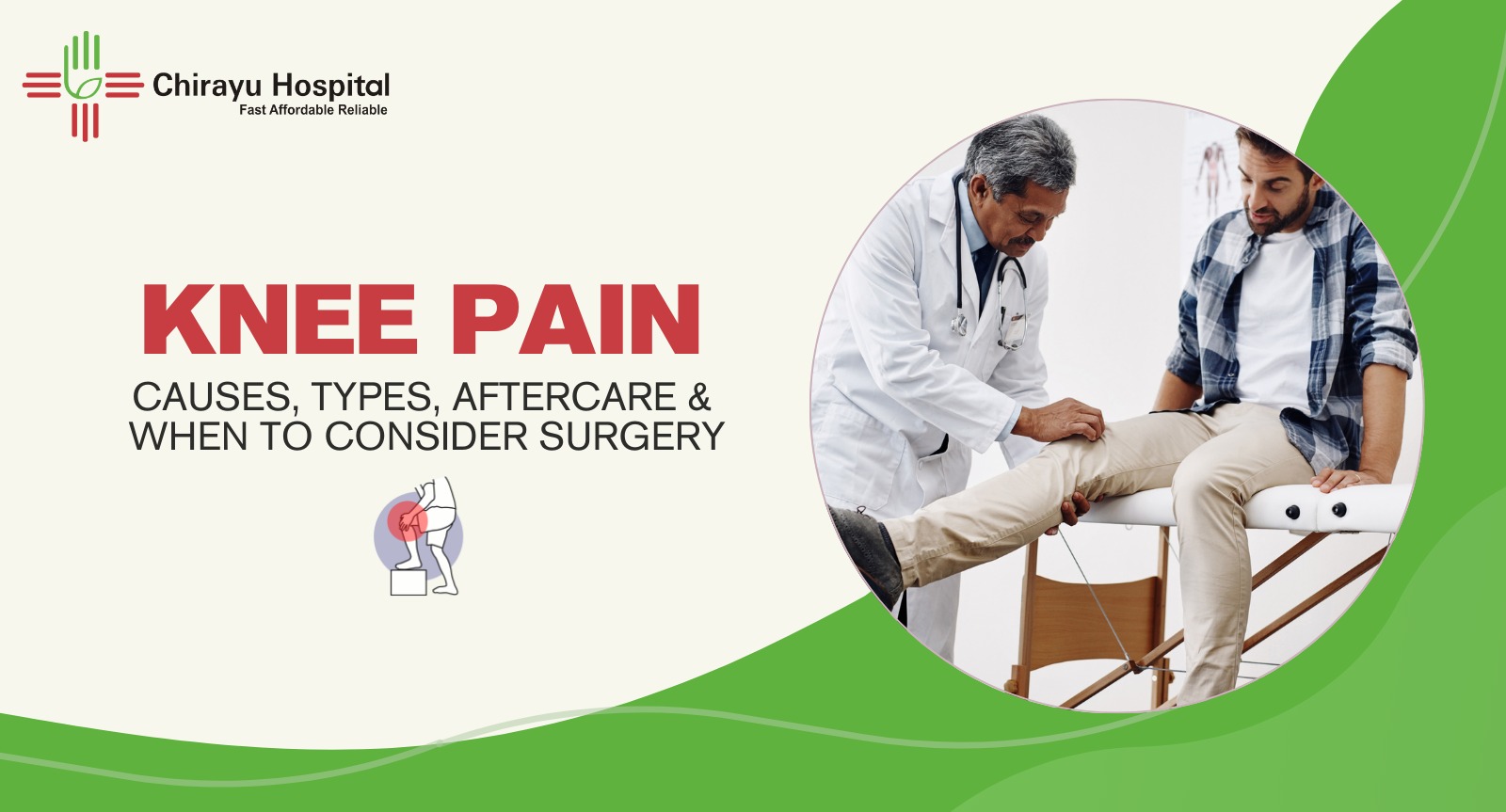Are you experiencing prolonged knee pain? Various factors can cause knee pain, and the most common treatment people in India opt for is surgery. Knee replacement is one of the most common surgeries in India. It is a highly effective procedure that can help individuals regain their mobility and strength, which they lost due to knee pain.
Various conditions can lead to knee replacement surgeries like arthritis, sudden accidents etc. Consult the best joint replacement hospital in Jaipur like the Chirayu Hospital for the best knee pain treatment and aftercare.
In this blog, we will discuss knee pain causes, common types of knee replacement, its different causes, aftercare and when is the time to consider knee replacement surgery.
Knee Pain Causes
Osteoarthritis
It is a condition where the cartilage present in the knee joint starts to tear down and breaks slowly over a period of time. It comes with knee pain, swelling and stiffness in the joint. If non-surgical methods like medications and physical therapy are unable to cure the condition, then doctors may recommend knee replacement.
Rheumatoid arthritis
It means inflammation of joints which can later lead to joint deformity and damage. Knee replacements in this type of arthritis have high success rates and is a reliable process.
Injury or trauma
When an individual is affected by a severe knee injury that is unable to heal with medications or physical therapy, doctors may suggest knee replacement. Injuries like fractures or ligament tears that result in chronic pain and instability may also require knee replacement surgery. Take advice from an experienced joint replacement hospital in Jaipur for personalised care and attention.
Other conditions
Conditions like gout, infection or congenital knee issues can also lead to knee replacement surgeries if unable to be cured by non-surgical methods.
Types of knee joint replacement
Below here are discussed 2 types of knee replacement surgeries, the choice of surgery depends upon the seriousness of your condition, knee pain and overall health.
Total knee replacement
It is the most common type of surgery. Here, the entire knee joint is replaced with an artificial prosthesis. This is recommended for someone with severe arthritis or a severe knee injury.
Partial knee replacement
When only the damaged portion of the knee joint is replaced and the healthy part is preserved, it is known as partial knee replacement. This procedure is recommended for someone with comparatively less widespread damage often due to osteoarthritis.
Alternate options for knee pain before surgery
Physical and occupational therapies
Physical therapy can help cure knee pain by specialised exercises and stretching. It improves mobility and increases strength. Doctors usually recommend taking 2-3 therapy sessions per week and the rest treatment plan is decided based on the patient’s condition and how severe is the knee pain.
Pain medications
If knee pain is not that frequent and severe. Doctors advise to take medications and suggest some changes before opting for surgery. Pain relief medications can fully cure or at least minimise knee pain.
Lifestyle modifications
Knee pain can occur due to excessive exercise or being overweight. Therefore, lifestyle changes may be suggested before opting for surgery.
When to consider surgery for knee pain
Here are a few signs that may indicate you should consider surgery:
-
Persistent pain
Despite medicines, physical therapies and other non-surgical methods, if still there is continuous pain in the knee joint, then it may be time for surgery.
-
Limited to zero mobility
If knee pain is restricting your mobility and daily life activities like walking, bending etc then knee joint replacement surgery can give you relief.
-
Failed non-surgical treatments
If all non-surgical methods like medicines, physical therapy and lifestyle changes can no longer provide you relief then surgery may be needed.
Aftercare and recovery
- Short-term care: You may experience a lot of knee pain just after the surgery. Doctors will monitor you closely and help you with the pain. They might give you pain relief medicines and ice packs or recommend exercises to help overcome the pain.
- Long-term recovery: Continue your physical therapies and medicines as recommended by the doctors. This would strengthen the muscles around your knee and restore its function.
- Additional tips: Along with your doctor’s guidelines, it is important to stay active, maintain a healthy diet and avoid high-risk activities for a successful recovery.
In conclusion, knee replacement surgery offers a powerful solution for those experiencing chronic knee pain and limited mobility. Chirayu Hospital, the best joint replacement hospital in Jaipur offers comprehensive care and the best treatment for Knee pain. If you’re struggling with knee pain and considering knee joint replacement, contact us today for a consultation with an orthopedic specialist.


